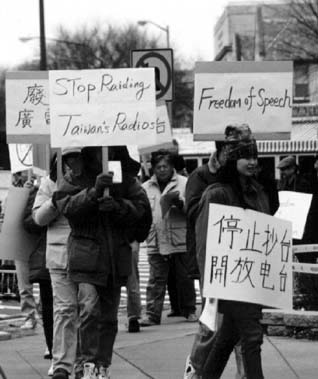 Taiwan Communiqué
No. 65, April 1995
Taiwan Communiqué
No. 65, April 1995 Taiwan Communiqué
No. 65, April 1995
Taiwan Communiqué
No. 65, April 1995After the December 1994 elections, the KMT authorities began a series of raids on opposition radio stations by seizing their broadcasting equipment in order to cripple their operations (see "Press Freedom Again Endangered in Taiwan", in Taiwan Communiqué no. 64).
The matter became an international affair at the end of January 1995, when Mr. Hsu Jung-chi, the popular talk-show host of the "Voice of Taiwan" station in Taipei, staged a five-day hunger strike in front of the Taiwan Economical and Cultural Representative Office (TECRO) in Washington D.C.
Mr. Hsu went on hunger strike to protest the crackdown by police and the censorship by the Government Information Office, and hoped to focus international attention on the issue of media control by the KMT authorities. Mr. Hsu and four of his colleagues braved sub-zero temperatures by sleeping at night in a van parked by the street in front of the Kuomintang's Office in DC at Wisconsin Avenue.

The Taiwanese community in the Greater Washington D.C. area lent its support to the hunger strikers by organizing a demonstration in front of the TECRO office on 28 January 1995. About a hundred Taiwanese-Americans, including university students and some sympathetic American friends took part in the two-hour demonstration.
The KMT crackdown on Taiwan's pirate stations also caught the attention of the U.S. Congress. On 2 February 1995, Congressman Peter Deutsch (D-Florida) held a hearing in the US Capitol to investigate the KMT monopoly over Taiwan's electronic media. Other Congressional participants included representatives Matt Salmon (R-Arizona) and Sherrod Brown (D-OH).
Witnesses included Mr. Hsu Jung-chi, the owner and anchor of the Voice of Taiwan, DPP legislator Chang Chun-hung, Mr. Michael Fonte, an American journalist who lived and worked in Taiwan in the late 1960s and Mr. Wes Pippert, who is on the faculty of the University of Missouri. Representatives from the Taiwan government, although invited, did not attend the hearing. DPP legislator Chang Chun-hung testified that the three major television stations are controlled by the Government. Taiwan Television (TTV) is controlled by the Taiwan provincial government, China Television (CTV) is a propaganda arm of the KMT-party itself, while the Chinese Television Service (CTS) is run by the Department of Defense. He also pointed out that during the December elections, the opposition DPP candidates received virtually no coverage on the three KMT-controlled television stations.
Mr. Hsu Jung-chi pointed out that the Broadcast and Television Law is unconstitutional and must be abolished, and a neutral organization (similar to the FCC in the United States) should be established to allocate air-wave frequencies to independent stations in a fair and impartial manner. American journalist Mike Fonte said that "until the time that independent television and radio stations operate in Taiwan, real democracy will not flourish because governmental accountability will be lacking and real debate during election cycles will not be possible."
On 9 March 1995, the Formosan Association for Public Affairs (FAPA) in Washington D.C. held a congressional luncheon in the Congress to continue the campaign to open up Taiwan's electronic media. Congressmen Deutsch (D-FL), Sherrod Brown (D-OH) and Robert Torricelli (D-NJ) spoke at the luncheon. The Kuomintang authorities, under criticism at home and abroad for their monopoly on the three existing stations, last year finally decided to take a small step in the right direction by opening up a fourth television station. According to reports from Taiwan, the license for the fourth station will be issued at the end of April. A group of DPP legislators and their supporters have pooled their resources together and applied for the license. However, their competitor is Mr. Chen Tien-mao, a KMT member and speaker of Kaohsiung City Council, who is the head of a multi-million dollars business group.
DPP Legislators Chang Chun-hung, Chai Trong-rong, former DPP Legislator Tien Tsai-ting and Mrs. Yu Chen Yueh-yin, the former county magistrate of Kaohsiung County, attended the FAPA luncheon and urged US Congressional leaders to impress upon the KMT authorities that fairness and a level playing field require that the democratic opposition on the island have full access to the electronic media. They emphasized that at a minimum, the license for the fourth television station be given to the democratic opposition.
Back to: Table of Contents
Copyright © 1995 Taiwan Communiqué